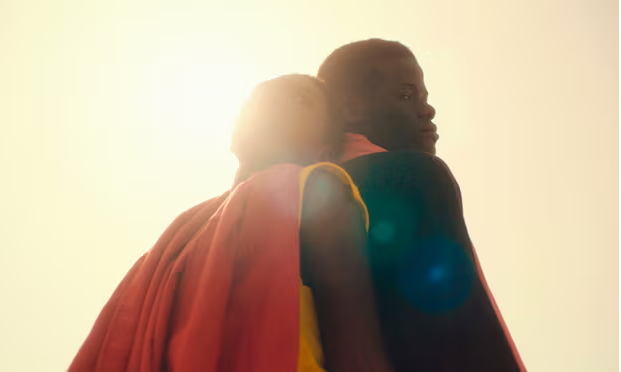(Ramata-Toulaye Sy, 2023, Mali/Senegal/France, 87 mins)
First-time French-Senegalese filmmaker Ramata-Toulaye Sy's supernatural-tinged love story, a Palme d'Or nominee at Cannes, is attuned to the beauty--and cruelty--of land, sky, and water. People, however, represent the greatest threat to a couple's happiness.
Though her husband, Adama (Mamadou Diallo), grew up believing the fables his elders taught him, Banel (Khady Mane, a promising newcomer like Diallo) is more skeptical. Compared to the rest of the tribe, the childhood sweethearts are free thinkers--to the disappointment of Adama's traditionalist mother. And though the marriage was arranged (after Banel's first husband died), the couple would prefer to live on their own outside the village. If Banel could simply help Adama to herd the cattle with the other men, rather than to work the land and wash the clothes like the other women, she would be happy. Her needs are simple and not unreasonable.
When drought overtakes the region, leading to the deaths of both elders and cattle, their independence becomes an affront. Worse yet, villagers believe it's the cause of their current difficulties. If Adama would agree to take over as chief, as preordained, and if Banel would provide him with an heir, all would be well, except he doesn't want the job and she doesn't want children.
The lack of any modern conveniences lends Banel & Adama a timeless quality. Not only could the film be set in most any era, but Banel is a feminist in a time and place in which people view her love for--rather than dependence on--her husband with suspicion, leading to increasingly erratic and downright cruel, self-sabotaging behavior the more they criticize and ostracize her, though she will eventually, possibly too late, take decisive action.
If it differs in look and feel, Banel & Adama offers the same empathetic approach to independent-minded women that characterized the work of Senegalese master Ousmane Sembène (Black Girl, Faat Kiné). It's a haunting film about being born too soon to live the life you deserve.
Banel & Adama plays Sat, May 18, at 9pm and Sun, May 19, at 11am at Pacific Place. For more information, click here.
JULY RHAPSODY / Lam Yan Sei Saap / 男人四十
(Ann Hui, 2002, Hong Kong, 103 minutes)
Wu (Karena Lam): "You're just a piece of antique after all!"
Lam (Jacky Cheung): "I've been a stiff all my life."
Wu: "Stiffs attract people to try and bend them."
Forty-year-old Lam (Cantopop star Jacky Cheung with a touch of grey at the temples) has a decent life in Hong Kong in Ann Hui's sensitively-rendered tale of midlife crisis. He has a full-time job teaching Chinese literature, a "model wife of 20 years" in Ching (Rouge's Anita Mui, who passed away in 2003, only one year after this film's release), and two teenaged sons.
He isn't poor, but his school friends have gotten a lot richer from the stock market, and it makes him uncomfortable. Wu (Karena Lam), a pretty secondary school student, also makes him uncomfortable, because she has a certain seductive quality--she also reminds him of his wife as a teenager.
When Ching takes time off to look after a pre-Lam ex-lover with terminal cancer--her future husband's tutor in their youth--Lam starts to spend time with Wu after school hours. It isn't sexual, or maybe it is (Hui leaves this part ambiguous), but it's definitely inappropriate. Class also plays a part since Lam has always tried to be the best in everything he does, while Wu initially lacks ambition, despite her evident talent as an essayist, possibly because she knows she'll always find a soft place to land no matter what she does or doesn't do. As she states near the end, "I always get what I want."
In his review at The Chinese Cinema, Seattle Film Critics Society colleague Sean Gilman referenced the Police's 1980 hit "Don't Stand So Close to Me," not necessarily facetiously, and he isn't off-base. Lam can't think straight whenever Wu enters his vicinity. Hui doesn't sexualize the actress, but focuses on her eyes, her hands, or the back of her head (the film was shot by Pung-Leung Kwan); that's all it takes to destabilize Lam's equilibrium. And that's what he sees in his mind's eye whenever she's not around.
I was a sophomore in high school when I first saw that acclaimed--at the time--Woody Allen film, and I could tell that Hemingway's Tracy was more of a middle-aged man's fantasy than an actual human being, though her charismatic performance sure fooled a lot of people. I guess it helps Hui's film that Lam and Wu don't have these sorts of conversations: Isaac (Allen), "Hey, how many times a night can you, how, how often can you make love in an evening?" Tracy, "Well, a lot." Eww.
By the end of July Rhapsody, Lam realizes he's "essential," despite all his dissatisfactions. He genuinely cares about his family, and he loves his job. The screenplay is from Ivy Ho, who wrote Peter Chan's Comrades, An Almost Love Story with Maggie Cheung and Leon Lai, one of cinema's more affecting love stories--in that case, historical events serve as more of an impediment to a lasting relationship than repressed memories or unresolved feelings. The actors here live up to that high standard, Jacky Cheung (As Tears Go By) above all. Though I haven't seen every film Ann Hui has made, every one I've seen is a winner, and July Rhapsody is no exception.
July Rhapsody plays on Sat, May 18, at 11:30am at SIFF Downtown. Though there's only one SIFF screening, it opens in the US on June 7. For more information, click here. Images from Film Forum (Khady Mane), The Guardian (Mane and Mamadou Diallo), The Film Stage (Jacky Cheung and Karena Lam), Mubi (Cheung with Anita Mui), and Cheng Cheng Films.





No comments:
Post a Comment